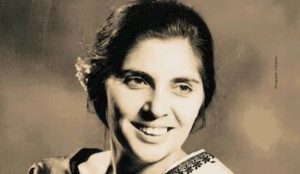
Fatima Meer
*Fatima Meer was born on this date in 1928. She was a South African Coloured writer, academic, screenwriter, and activist.
Fatima Meer was born in the Grey Streets of Durban, South Africa, into a middle-class family of nine. Her father was Moosa Ismail Meer, a newspaper editor of The Indian Views. Her mother, Rachel Farrell, was orphaned and of Jewish and Portuguese descent. Both parents instilled in her a consciousness of the racial discrimination that existed in the country. She converted to Islam and changed her first name to Amina. She completed her schooling at the Durban Indian Girls High School. While a student, she mobilized students to create the Student Passive Resistance Committee to gather funds for the Indian community's passive resistance campaign from 1946 to 1948.
She attended the University of the Witwatersrand for one year and was a member of a Trotskyism group affiliated with the Non-European Unity Movement (NEUM). She attended the University of Natal, receiving a bachelor's degree and a master's degree in Sociology. Political activist Meer became one of the first women to be elected as an executive of the Natal Indian Congress (NIC) in 1950. She helped to establish the Durban and District Women's League in October 1952 as a group of 70 women. This organization was to build alliances between Africans and Indians because of the Durban race riots between the two groups in 1949.
She became the secretary of the league. The league organized Childcare and distributed milk at Cato Manor. This league also gathered funds for victims caused by a tornado at Springs, where Africans became homeless, and successfully collected £4000 for the Sea Cow Lake flood victims. After the National Party gained power in 1948 and started implementing its policy of Apartheid, Meer's activism increased, and she was first "banned" in 1952 for three years. Fatima Meer married her first cousin in 1950, Ismail Meer. This was not uncommon in the Sunni Bhora community where she grew up. Ismail Meer was a lawyer and apartheid activist. He was an active member of the KwaZulu-Natal ANC provincial legislature.
She was one of the founding members of the Federation of South African Women (FEDSAW) in April 1954, which spearheaded the historic women's march on the Union Buildings, Pretoria, in August 1956. She was one of the leaders of the Women's March in 1956. The same year, she organized a committee to gather funds for bail and support families from Natal political leaders in the Treason Trial. In the 1960s, she organized night vigils to protest the mass detention of anti-apartheid activists without trial outside Durban prison. Fatima Meer also organized a week-long vigil at the Gandhi Settlement in Phoenix.
During the 1970s, she embraced Black Consciousness Ideology with the South African Student Organization (SASO) led by Steve Biko. She published her book entitled Portrait of Indian South Africans in 1969 and donated all revenue from the book's sale to the Gandhi Settlement. She helped in an operation to rescue 10,000 Indian flood victims at Tin Town on the banks of the Umgeni River. Meer built temporary housing in a tent and organized relief food and clothing. Later, she successfully negotiated a permanent settlement for them in Phoenix. She founded the Institute for Black Research (IBR), which became a research and publishing institution and educational NGO in 1972. In 1975, Meer co-founded the Black Women's Federation (BWF) with Winnie Mandela and became its first president.
A year later, she was banned again for five years. The ban order came after she attended a meeting of the Black Studies Program, where she was a key speaker in a speech entitled "Twenty-Five Years of Apartheid Rule." After the Soweto Uprisings, she and ten other women from BWF were arrested and placed in solitary confinement. She survived an assassination attempt when she was shot at her family home in Durban. Her son, Rashid, went into exile in the same year. During the 1980s, Meer founded the Co-ordinating Committee of Black (Indian, Coloured, African) Ratepayers Organizations and the Concerned Citizens' Group [CCG] to persuade Indian people not to vote for white parties.
Academic and writer
From 1956 to 1988, Meer became a sociology lecturer and a staff member of the University of Natal. She was the first non-white person to hold that position. She was also a visiting professor at several universities abroad. Meer became a fellow of the London School of Economics and received three honorary doctorates from Swarthmore College, Bennett College, and Natal University. She strongly supported the Iranian Revolution and boycotted Salman Rushdie's trip to South Africa in 1998, claiming he was a blasphemer. She was involved in protesting the oppression and assault of the Palestinian people and the US-led invasion of Afghanistan. In 2000, her son Rashid died in a car accident. Fatima Meer died on March 12, 2010. She had two daughters, a Land Claims Court judge, and a social science consultant.